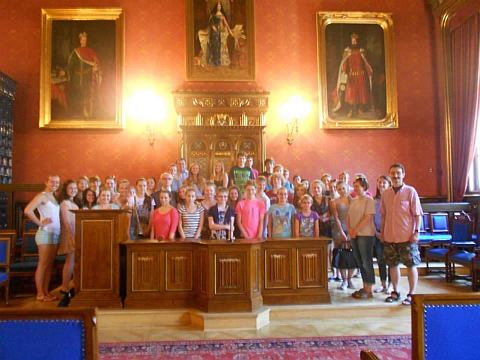LANGUAGE AND CULTURE PROGRAMME
 Primarily targeted at international youth of Polish origin, the language and culture programme is divided into several areas. A strong emphasis is placed on presenting contemporary Poland as a member of the European Union, a country that has undergone a huge civilizational transformation in the past 25 years and continues to experience dynamic growth. Innovative teaching methods, integrated with leisure activities and academic projects, aim to prove that learning can and should involve a passion for discovery. Thanks to our project-based teaching method, students understand that learning Polish has a very practical dimension. We teach the language to help young people from different countries communicate with one another, get things done, and achieve their goals. Learning is not just about memorizing rules and principles; rather, it should bring very tangible benefits. The language and culture programme also proposes to imbue participants with the habit and joy of independent exploration and the discovery of their roots and the richness of their country, as well as to encourage them to improve their skills in the language they already more or less know.
Primarily targeted at international youth of Polish origin, the language and culture programme is divided into several areas. A strong emphasis is placed on presenting contemporary Poland as a member of the European Union, a country that has undergone a huge civilizational transformation in the past 25 years and continues to experience dynamic growth. Innovative teaching methods, integrated with leisure activities and academic projects, aim to prove that learning can and should involve a passion for discovery. Thanks to our project-based teaching method, students understand that learning Polish has a very practical dimension. We teach the language to help young people from different countries communicate with one another, get things done, and achieve their goals. Learning is not just about memorizing rules and principles; rather, it should bring very tangible benefits. The language and culture programme also proposes to imbue participants with the habit and joy of independent exploration and the discovery of their roots and the richness of their country, as well as to encourage them to improve their skills in the language they already more or less know.Another reason behind the inclusion of youth camps in the programme was the growing interest of foreign students in Polish universities. When drawing up the camp’s agenda, one of our main objectives was to show Poland, Kraków and the Jagiellonian University as places that experience dynamic growth, offer very good opportunities and are welcoming to foreigners and people of Polish origin.
Skills and competences developed during the camp:
• Our main goal is to organize the programme so that students develop language skills during the entire camp, not just through traditional language classes, but also via games, activities, trips and projects. Learning must take on an attractive form that motivates students to learn and expand their knowledge.
• In our approach to developing communication skills, we make sure that linguistic, sociolinguistic, pragmatic and functional skills are all correlated with one another so that the language is taught in specific social and cultural contexts and their mutual interactions. Depending on the needs of the group, emphasis will be placed on different sets of language skills. For example, for students of Polish origin, spelling and pronunciation are of key importance. Future university candidates, on the other hand, will find semantic and lexical skills more essential. The division of participants into groups will respect these different perspectives.
• Communication skills are also taught in tandem with general skills, such as sociocultural knowledge and intercultural sensitivity.
• As regards sociocultural competences, our goal is to develop language skills in a broader context that will encompass an intercultural perspective. The project-based teaching method facilitates this task and at the same time allows us to focus on the practical use of language in action.
• Our approach to social and cultural issues focuses on the present day. For foreigners, it is contemporary Poland and the changes it has undergone in the last 25 years that is the most interesting.
Language classes (40 hours) are taught in well-equipped classrooms adapted to the needs of youth education.

